Gas For Tent Campers
Liquefied petroleum gas (LPG), normally referred to as simply - gas - is used to power most stoves, heaters and non-electric lanterns for camping. LPG comes as a liquid held under pressure in a cylinder or cartridge and only becomes a gas when released from the container.
Sometimes the gas that is released from the cylinder has to be adjusted to a suitable pressure for the appliances to operate properly and this means using a regulator. When empty, the cylinder or cartridge is discarded or exchanged for a full one. Two different gases are used - propane or butane - and these have slightly different characteristics. This guide is intended to help you with your choice and safe use of gas equipment.
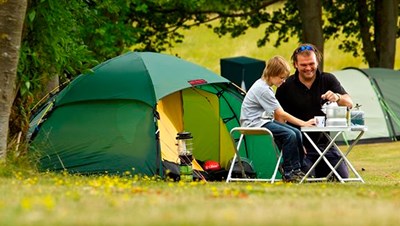
Gas cartridges and cylinders for tent campers
For simple cooking purposes many small camping stoves use disposable cartridges that screw or clip on to the equipment and power the device directly. When empty they are discarded (following disposal guidelines) and replaced. They come in two types - pierceable or with an integral valve - as well as a wide range of sizes, shapes and capacity.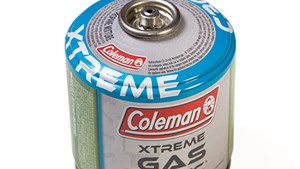
When a pierceable cartridge is fitted to the appliance a hollow spike punctures the cartridge, which releases the gas to the appliance. Once fitted it cannot be removed without letting the gas escape. Pierceable cartridges of different makes are usually interchangeable, but they should comply with European Standard EN417 type 200.
More expensive, but generally safer and easier to use, are cartridges with an integral valve. They can be removed from the appliance when travelling, thus saving the gas inside as the valve reseals the cartridge. Most of these cartridges have screw fittings complying with EN417 type 200. Some appliance manufacturers provide unique cartridges and fittings that tie you in to that specific manufacturer for refills. If you choose one of these check the availability of refills in the area you are travelling.
Other appliances use refillable cylinders that are larger gas containers (often called bottles) and require a clip-on or screw-on regulator to regulate the gas pressure delivered to the appliance. Probably the most popular and widely available range of gas cartridges and cylinders is the Campingaz range (see table 1).
Larger cylinders
For longer trips, some tent campers like to use cylinders with more capacity than the Campingaz range supplies. Table 2 shows the various types of cylinders most commonly found in the UK and their weights and dimensions.
You also need to ensure you have the correct regulator to suit the type of gas and cylinder outlets. Butane regulators often have a simple clip-on regulator but large propane cylinders will normally need a spanner to fit them - and it will be a left-hand thread, so turning clockwise unscrews it. Normally butane camping appliances will require a 28mbar regulator and propane appliances a 30mbar or 37mbar regulator, but always check the appliance instructions.
While the larger sized cylinders may be cheaper per unit of gas, the smaller units are usually preferable on the basis of ease of transport, safety in travel and stability when standing on the campsite.
Which Gas?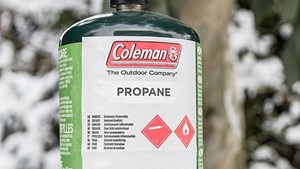
The type of gas to use for camping depends mainly on the temperature. Propane can be used all the year round while liquid butane is hard to turn to gas at anything below about 4C. Now that the price of the two gases is very similar there is little advantage to buying butane, though you do get marginally more energy from a butane cylinder than a propane one of the same volume. Many of the smaller cartridges will have a mixture of propane and butane that should be suitable for most activities all year round.
Many small camping cartridges often have a blend of both common gasses so they can offer a wider performance range, sometime augmented with a derivative of butane called isobutane, they'll still give adequate performance when in sub-zero conditions.
Locating LPG cylinders
In recent years it has been difficult to locate suitable cylinders, normally camping and caravan accessory shops and sometimes fuel stations may have suitable stock. Most of the brands have major depots that may hold a stock of cylinders so check their website (listed here in Contacts) for the latest information as they may even deliver to your door. The Camping-Gas website has a up to date directory of retailers for cylinders, use the location supplier or size filters for the best results. Remember to call first to ensure the retailer still provides the required service and avoid a wasted journey.
Touring abroad
Check before you travel for the rules that may apply to carrying gas cylinders, for example on ferries or through the Channel Tunnel. You cannot carry any pressurised gas cartridge or cylinder on an aircraft. LPG supplies in Europe are generally different from UK and you may not be able to exchange your brand of cylinders and as you travel you may notice each country has its own big brands. One of the advantages of Campingaz is its wide availability in Western Europe. The company has a useful website (see contacts) that allows you to locate Campingaz outlets abroad.
Small camping cartridges are readily available throughout mainland Europe, the brand may be different but the contents will all be broadly the same.
Maintenance
All gas appliances need regular checking to ensure they are operating safely. Generally with simple camping gas equipment you need to be sensible about using them.
Make sure all connections are secure and never use an appliance that appears to be leaking. Inspect all hoses regularly for signs of cracking or other deterioration and replace them at least every five years. The date of manufacture should be stamped on the hose. Check the hose clamps are sound.
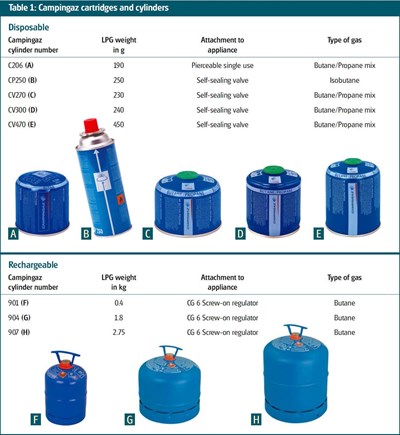
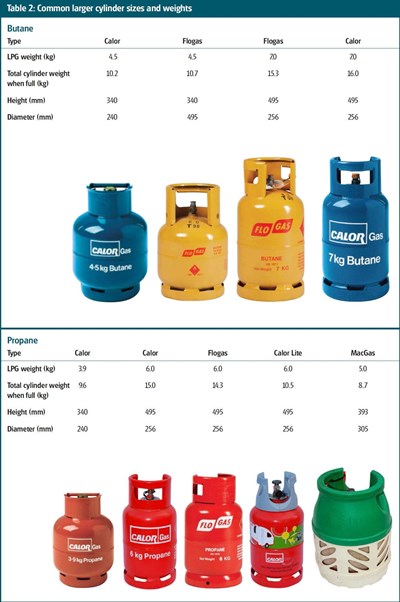
Safety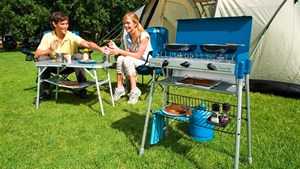
LPG should be a safe product if properly handled and used. It is non-toxic and will only burn when sufficient air is present, but then it is highly flammable.
Cooking inside a tent is not advisable, unless a suitable cooking area is provided such as one in a trailer tent with kitchen annex and plenty of ventilation. Modern synthetic fabrics used for tents have many advantages but tend to be far more susceptible to heat damage than cotton canvas and do not provide as much ventilation. Cooking outside can be done under a porch canopy, but make sure the appliance is kept well away from the tent fabric. In all cases be aware of the dangers of carbon monoxide poisoning - see online at www.myccc.co.uk/COsafety for more details.
Ventilation is important as gas appliances give off the products of combustion and can therefore be dangerous inside a tent, especially if used for long periods. Remember they will use oxygen as they burn, so even a gas lantern can eventually dangerously deplete the breathable air inside. Modern tents, especially those with sewn-in groundsheets, have ventilation designed for people, not gas appliances.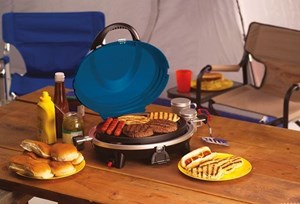
Great care needs to be taken when changing cylinders or cartridges. Make sure you are familiar with the way the cartridge or cylinder fits on the appliance or regulator and always carry out the changeover in the open air, never in a tent or building and never near naked flames. Dispose of empty gas containers with care. Never throw them on a fire because any gas residue could lead to an explosion. If you suspect an appliance or gas container is leaking, particularly if liquid gas starts to spray out, get everyone away from the appliance until the container is empty and the gas has dispersed naturally.
When travelling and on site ensure the cylinder or cartridge is kept well away from any source of heat or ignition. Keep it upright at all times (unless it is designed to be used otherwise) and away from damp, dirt, dust or anything that could damage the container or its valve equipment. If you have the use of a trailer keep the gas supply in there and not in the car and avoid keeping a cylinder in your tent overnight.
Remember:
- NEVER use a naked flame to look for leaks. A pungent smell is added to the gas to make it easy to detect. The gas is heavier than air and will pool on the ground
- If a pierceable cartridge leaks, allow it to empty naturally in a well-ventilated area and do not attempt to disconnect or reconnect it
- Always turn off the gas on a conventional cylinder before disconnecting for travel
- Never smoke when changing cylinders or cartridges
- Make sure all ventilation spaces are clear of obstructions
- Site gas appliances away from flammable materials before lighting and never move them when lit
- Carry a suitable fire blanket and/or fire extinguisher, know how to use it and make sure it has not passed its expiry date
- Be aware of the dangers of carbon monoxide poisoning and consider using a CO alarm - see www.myccc.co.uk/COsafety.
